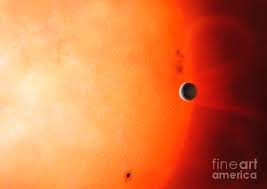Teacher training: Extrasolar planets
About 5000 extrasolar planets are known to date. In recent years, the discovery of a planet orbiting a star other than our Sun seems to be nothing special anymore and has already found its way into non-fiction books for children. But how do you find a planet and how can you create as complete a profile as possible with its properties – radius, mass and composition?
In this training session, we will introduce the basics of exoplanet research and, in particular, discuss the transit method with its challenges, which is used by ground-based telescopes and in space missions such as Kepler and PLATO.
Citizen science programs allow amateurs to analyze data from various telescopes for transit searches. One project is the NGTS (Next Generation Transit Survey) planet hunter, which we will discuss in more depth in the advanced training. It is a telescope facility in the Chilean Atakama Desert, where DLR contributed eight of the twelve cameras and is part of the scientific team. is part of the scientific team.
Target group: Teachers of secondary level I and II, especially for MINT subjects, but also anyone with an interest in a current astronomical topic.
Date: Tuesday, May 24, 2022, 3 – 6 p.m.
Location: Deutsches Zentrum für Luft- und Raumfahrt (DLR), Rutherfordstr. 2, 12489 Berlin, Germany.
Organizer: DLR-Institut für Planetenforschung, DLR_School_Lab Berlin and DFG Schwerpunktprogramm SPP1992, Exploration of the Diversity of Extrasolar Planets.
Registration: Please email schoollab-berlin@dlr.de with the following information: Surname, first name, nationality (for admission service) and school.
Few places for teacher training availabe!

